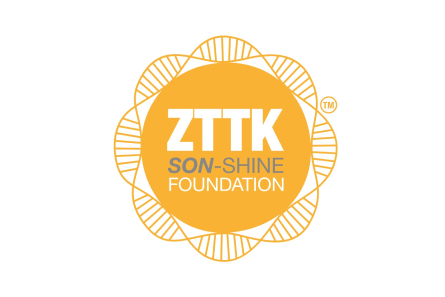ZTTK SON-Shine Foundation
Cycle 3
ZTTK is an ultrarare, monogenic, neurodevelopmental disease. The most common symptoms of ZTTK are intellectual disabiilty, speech delay, motor delay, facial morphology, hypotonia, feeding difficulties, and epilepsy.
Last updated 04/30/2025
Clinical
Disease Class
Ciliopathies
Genetic diseases
Inherited metabolic disorder
Neurological diseases
Body Systems
Cardiovascular / Circulatory
Digestive
Endocrine
Hematopoietic / Lymphatic / Immune
Integumentary / Exocrine
Metabolic
Muscular / Skeletal
Nervous / Sensory
Renal / Urinary / Excretory
Reproductive
Respiratory
Organs
Adrenal glands
Arteries
Bladder
Blood
Bone marrow
Bones
Brain
Connective tissue / joints
Ears
Esophagus
Eyes
Gallbladder
Hair
Heart
Intestines
Kidneys
Lungs
Lymph fluid, nodes, ducts, vessels
Mouth / teeth
Muscles
Nails
Nerves
Nose
Pancreas
Scrotum
Skin
Spinal cord
Stomach
Throat/pharynx
Thyroid
Known Genetic Link
Yes, one or more genes directly cause the condition
causative_genes
SON
contributory_genes
None specified / unknown
Type of Inheritance
Autosomal dominant
De novo
Newborn Screening
No
Disease Mechanism(s)
Cilia dysfunction
Inherited metabolic disorder
Pathogenic mutation
Age of Onset
Adolescence (12-17)
Early childhood (age 1+-5)
Infancy (age 0-1)
Middle childhood (6-11)
Prebirth
Average Age at Diagnosis
Early childhood (age 1+-5)
Infancy (age 0-1)
Middle childhood (6-11)
Life Expectancy
Adolescence (12-17)
Adulthood (age 18-64)
Early childhood (age 1+-5)
Infancy (age 0-1)
Middle childhood (6-11)
Pre-Birth
Affected Sex(es)
Female
Male
National Prevalence
Unknown
Global Prevalence
Unknown
National Incidence
Unknown
Global Incidence
Unknown
Populations and/or ancestry with higher prevalence
Wealthy developed countries that have access to whole exome/genome sequencing see higher prevalence rates due to ability to diagnose
Symptoms / Phenotypes
abnormal brain features
abnormal circulating immunoglobulin concentration
abnormal ear morphology
abnormal fingernail morphology
abnormal hair morphology
abnormal heart morphology
abnormal oral morphology
abnormal respiratory system morphology
abnormal skeletal morphology
abnormal skin morphology
abnormality of joint mobility
abnormality of the kidney
abnormality of vitamin metabolism
adrenal insufficiency
anemia
anxiety
asthma
attention disorders / ADHD
atypical puberty
autistic behavior
blood disorders
breathing difficulties
cardiac abnormalities
craniofacial abnormalities
cutaneous photosensitivity
developmental delay
distinctive facial features
excessive salivation
failure to thrive
feeding difficulties
fingernail dysplasia
gastroesophageal reflux
gastrointestinal disorders
growth delay / deficiency
hallucinations
headaches / migraines
hearing loss / hearing impairment
hydrocephalus
hypertension
hypertonia
hypoglycemia
hypohidrosis
hypotonia
immune deficiency / immunodeficiency
infection, ear / otits media
infection, lung
inflammatory abnormality of the skin
intellectual delay / global developmental delay
kidney disease / nephropathy
laryngomalacia
mast cell activation syndrome (MCAS)
nose bleed / epistaxis
polycythemia
poor wound healing
recurrent urinary tract infections
seizures / epilepsy
short stature
sleep disorders
stroke
unusual skin infection
vision problems
vomiting / nausea
Biomarkers
None
Existing Therapies
None
Organizational & Research
Cell Lines
iPSCs
Cell Lines, Institution
COMBINEDBrain
Thermo Fisher Scientific
Cell Lines, Involvement
Consulted
Cell Lines, share
All our cell lines are freely available
Disease Model
None
Disease Model, share
N/A
Clinical Trial Role
Not involved
Biobank, Institution
COMBINEDBrain
Biobank, Involvement
Consulted
Center of Excellence, Institution
None
Registry
Yes, we have collaborated on a registry
Data Collected, Registry
Genetic data
Patient contact info
Patient-reported data
Data Entered by, Registry
Patients
Platform, Registry
RARE-X
Natural History Study
Yes, we have collaborated on a natural history study
Data Collected, Natural History Study
Electronic health records/electronic medical records
Platform, Natural History Study
Citizen Health
FDA Patient Listening Session
No
FDA Patient-Focused Drug Development (PFDD) Program
No
ICD Codes
No, we do not have any ICD codes
Diagnostic Guidelines
In the process of creating diagnostic guidance for our website
In the process of creating formal diagnostic guidelines for publication in a peer-reviewed journal
In the process of developing accredited guidelines
Science Advisory Board Policies
No policies
Research Network Policies
Has CRN but no policies
Research Roadmap
Yes we have a Research Roadmap, and will share policies
International Chapters
Asia
Europe
North America
International Partners
None
